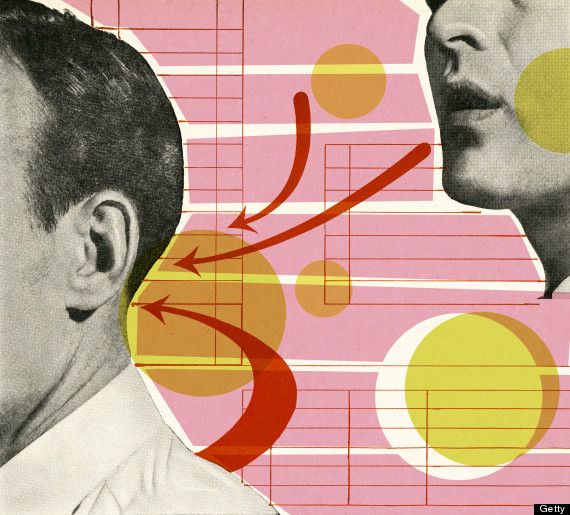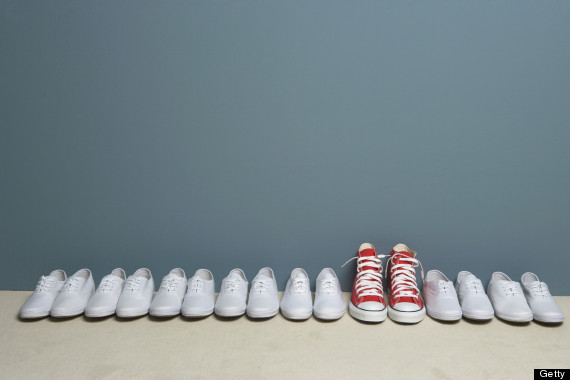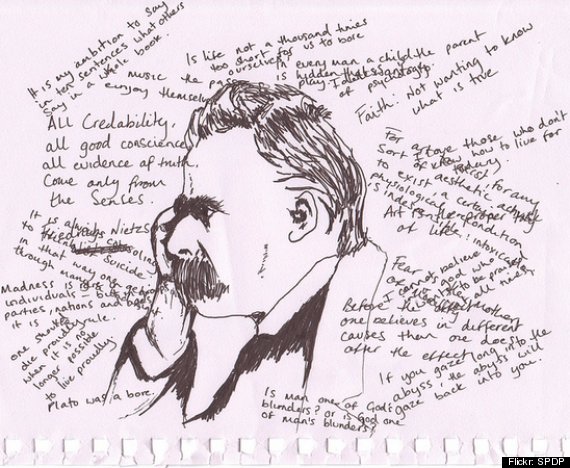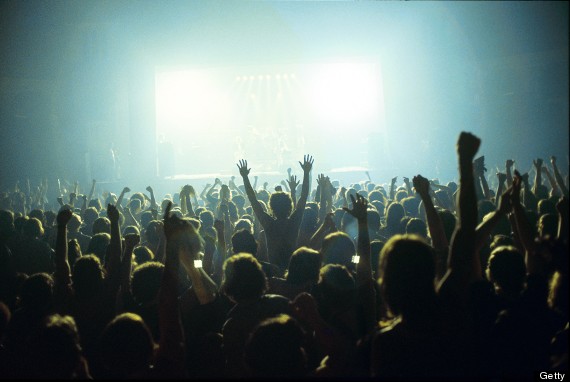23 Signs You're Secretly An Introvert

Think you can spot an introvert in a crowd? Think again. Although the stereotypical introvert may be the one at the party who's hanging out alone by the food table fiddling with an iPhone, the "social butterfly" can just as easily have an introverted personality.
"Spotting the introvert can be harder than finding Waldo," Sophia Dembling, author of "The Introvert's Way: Living a Quiet Life in a Noisy World," tells The Huffington Post. "A lot of introverts can pass as extroverts."
People are frequently unaware that they’re introverts -– especially if they’re not shy -- because they may not realize that being an introvert is about more than just cultivating time alone. Instead, it can be more instructive to pay attention to whether they're losing or gaining energy from being around others, even if the company of friends gives them pleasure.
“Introversion is a basic temperament, so the social aspect -- which is what people focus on -- is really a small part of being an introvert," Dr. Marti Olsen Laney, psychotherapist and author of "The Introvert Advantage," said in a Mensa discussion. "It affects everything in your life.”
Despite the growing conversation around introversion, it remains a frequently misunderstood personality trait. As recently as 2010, the American Psychiatric Association even considered classifying "introverted personality" as a disorder by listing it in the Diagnostic and Statistical Manual (DSM-5), a manual used to diagnose mental illness.
But more and more introverts are speaking out about what it really means to be a "quiet" type. Not sure if you're an innie or an outie? See if any of these 23 telltale signs of introversion apply to you.
1. You find small talk incredibly cumbersome.

Introverts are notoriously small talk-phobic, as they find idle chatter to be a source of anxiety, or at least annoyance. For many quiet types, chitchat can feel disingenuous.
“Let's clear one thing up: Introverts do not hate small talk because we dislike people," Laurie Helgoe writes in "Introvert Power: Why Your Inner Life Is Your Hidden Strength." "We hate small talk because we hate the barrier it creates between people.”
2. You go to parties -– but not to meet people.
If you're an introvert, you may sometimes enjoy going to parties, but chances are, you're not going because you're excited to meet new people. At a party, most introverts would rather spend time with people they already know and feel comfortable around. If you happen to meet a new person that you connect with, great -- but meeting people is rarely the goal.
3. You often feel alone in a crowd.

Ever feel like an outsider in the middle of social gatherings and group activities, even with people you know?
"If you tend to find yourself feeling alone in a crowd, you might be an introvert," says Dembling. "We might let friends or activities pick us, rather than extending our own invitations."
4. Networking makes you feel like a phony.
Networking (read: small-talk with the end goal of advancing your career) can feel particularly disingenuous for introverts, who crave authenticity in their interactions.
"Networking is stressful if we do it in the ways that are stressful to us," Dembling says, advising introverts to network in small, intimate groups rather than at large mixers.
5. You've been called "too intense."

Do you have a penchant for philosophical conversations and a love of thought-provoking books and movies? If so, you're a textbook introvert.
"Introverts like to jump into the deep end," says Dembling.
6. You're easily distracted.
While extroverts tend to get bored easily when they don't have enough to do, introverts have the opposite problem -- they get easily distracted and overwhelmed in environments with an excess of stimulation.
"Extroverts are commonly found to be more easily bored than introverts on monotonous tasks, probably because they require and thrive on high levels of stimulation," Clark University researchers wrote in a paper published in the Journal of Personality and Social Psychology. "In contrast, introverts are more easily distracted than extroverts and, hence, prefer relatively unstimulating environments."
7. Downtime doesn’t feel unproductive to you.

One of the most fundamental characteristics of introverts is that they need time alone to recharge their batteries. Whereas an extrovert might get bored or antsy spending a day at home alone with tea and a stack of magazines, this sort of down time feels necessary and satisfying to an introvert.
8. Giving a talk in front of 500 people is less stressful than having to mingle with those people afterwards.
Introverts can be excellent leaders and public speakers -- and although they're stereotyped as being the shrinking violet, they don't necessarily shy away from the spotlight. Performers like Lady Gaga, Christina Aguilera and Emma Watson all identify as introverts, and an estimated 40 percent of CEOs have introverted personalities. Instead, an introvert might struggle more with meeting and greeting large groups of people on an individual basis.
9. When you get on the subway, you sit at the end of the bench -– not in the middle.

Whenever possible, introverts tend to avoid being surrounded by people on all sides.
"We're likely to sit in places where we can get away when we're ready to -- easily," says Dembling. "When I go to the theater, I want the aisle seat or the back seat."
10. You start to shut down after you’ve been active for too long.
Do you start to get tired and unresponsive after you've been out and about for too long? It's likely because you’re trying to conserve energy. Everything introverts do in the outside world causes them to expend energy, after which they'll need to go back and replenish their stores in a quiet environment, says Dembling. Short of a quiet place to go, many introverts will resort to zoning out.
11. You're in a relationship with an extrovert.

It's true that opposites attract, and introverts frequently gravitate towards outgoing extroverts who encourage them to have fun and not take themselves too seriously.
"Introverts are sometimes drawn to extroverts because they like being able to ride their 'fun bubble,'" Dembling says.
12. You'd rather be an expert at one thing than try to do everything.
The dominant brain pathways introverts use is one that allows you to focus and think about things for a while, so they’re geared toward intense study and developing expertise, according to Olsen Laney.
13. You actively avoid any shows that might involve audience participation.
Because really, is anything more terrifying?
14. You screen all your calls -- even from friends.

You may not pick up your phone even from people you like, but you’ll call them back as soon as you’re mentally prepared and have gathered the energy for the conversation.
"To me, a ringing phone is like having somebody jump out of a closet and go 'BOO!,'" says Dembling. "I do like having a long, nice phone call with a friend -- as long as it's not jumping out of the sky at me."
15. You notice details that others don't.
The upside of being overwhelmed by too much stimuli is that introverts often have a keen eye for detail, noticing things that may escape others around them. Research has found that introverts exhibit increased brain activity when processing visual information, as compared to extroverts.
16. You have a constantly running inner monologue.

“Extroverts don’t have the same internal talking as we do,” says Olsen Laney. “Most introverts need to think first and talk later."
17. You have low blood pressure.
A 2006 Japanese study found that introverts tend to have lower blood pressure than their extroverted counterparts.
18. You’ve been called an “old soul” -– since your 20s.

Introverts observe and take in a lot of information, and they think before they speak, leading them to appear wise to others.
"Introverts tend to think hard and be analytical," says Dembling. "That can make them seem wise."
19. You don't feel "high" from your surroundings

Neurochemically speaking, things like huge parties just aren’t your thing. Extroverts and introverts differ significantly in how their brains process experiences through "reward" centers.
Researchers demonstrated this phenomenon by giving Ritalin -- the ADHD drug that stimulates dopamine production in the brain -- to introverted and extroverted college students. They found that extroverts were more likely to associate the feeling of euphoria achieved by the rush of dopamine with the environment they were in. Introverts, by contrast, did not connect the feeling of reward to their surroundings. The study "suggests that introverts have a fundamental difference in how strongly they process rewards from their environment, with the brains of introverts weighing internal cues more strongly than external motivational and reward cues," explained LiveScience's Tia Ghose.
20. You look at the big picture.
When describing the way that introverts think, Jung explained that they're more interested in ideas and the big picture rather than facts and details. Of course, many introverts excel in detail-oriented tasks -- but they often have a mind for more abstract concepts as well.
"Introverts do really enjoy abstract discussion," says Dembling.
21. You’ve been told to “come out of your shell.”

Many introverted children come to believe that there's something "wrong" with them if they're naturally less outspoken and assertive than their peers. Introverted adults often say that as children, they were told to come out of their shells or participate more in class.
22. You’re a writer.
Introverts are often better at communicating in writing than in person, and many are drawn to the solitary, creative profession of writing. Most introverts --like "Harry Potter" author J.K. Rowling -- say that they feel most creatively charged when they have time to be alone with their thoughts.
23. You alternate between phases of work and solitude, and periods of social activity.
Introverts can move around their introverted “set point” which determines how they need to balance solitude with social activity. But when they move too much -- possibly by over-exerting themselves with too much socializing and busyness -- they get stressed and need to come back to themselves, according Olsen Laney. This may manifest as going through periods of heightened social activity, and then balancing it out with a period of inwardness and solitude.
"There's a recovery point that seems to be correlated with how much interaction you've done," says Dembling. "We all have our own private cycles."
----------------------------------------
--------------------------------------
-------------------------------
How an Introvert Can Be Happier: Act Like an Extrovert
Extroverts, those outgoing, gregarious types who wear their personalities on their sleeve, are generally happier, studies show. Some research also has found that introverts, who are more withdrawn in nature, will feel a greater sense of happiness if they act extroverted.
Experts aren't entirely sure why behaving like an extrovert makes people feel better. One theory is that being talkative and engaging influences how people respond to you, especially if that response is positive. Others speculate that people get more satisfaction when they express their core self and opinions. Another possibility: Happiness might come simply from having successfully completed a goal, such as giving a speech.
"If you're introverted and act extroverted, you will be happier. It doesn't matter who you are, it's all about what you do," said William Fleeson, a psychology professor at Wake Forest University in Winston-Salem, N.C.
Other studies have shown that extroverts are more motivated than introverts. Researchers believe this is due in part to extroverts' greater sensitivity to dopamine, a neurotransmitter that plays a big role in behavior driven by rewards.
Clark Powell considers himself an introvert, but his job as vice president of a media relations and multimedia production firm means he often must act out of character. "My job requires me to be on TV…and to do media training and presentations in front of large groups of people, as painful as that can be sometimes," said the 46-year-old in Columbia, Ohio. Though he may dread making a presentation, he says he is exhilarated afterward. "I do feel a sense of relief and elation, but I don't know if that's because of the experience or because the experience is over," he said.
Mr. Powell disagrees with research findings that extroverts are happier and more motivated. While extroverts might derive happiness through feedback from others, Mr. Powell says his sources of pleasure include learning new things and reading a good book. "I may not share my happiness as willingly as other people…but I consider myself just as happy and I'm extremely motivated to learn and grow as an individual."
Whether a person is an extrovert or introvert is one of the big five traits commonly used by psychologists to classify personalities. (The others are openness to experience, conscientiousness, agreeableness and neuroticism.) Researchers say people generally fall somewhere in the middle, with attributes of both types. Extroverts tend to thrive off of interaction with other people. Introverts are typically more reserved, but not necessarily shy. They prefer solitary behavior or engaging in small groups.
Researchers say genetics may play a large role in whether we are more extroverted or introverted. Social experiences, especially those outside of the family environment, are also important, particularly as a child and young adult when the connectivity between neurons is being established.
Dr. Fleeson, of Wake Forest University, reported in a 2012 article in the Journal of Personality the results of an experiment that found introverts experience greater levels of happiness when they act more extroverted. In the weeklong study, researchers followed 85 people who recorded on Palm Pilots how extroverted they were acting and how happy they were feeling. Other studies of introvert behavior have reached similar conclusions.
So why don't introverts act like extroverts more often? John Zelenski, a psychologist at Carleton University in Ottawa, and fellow researchers probed that question in an April article in the Journal of Personality and Social Psychology.
A series of studies, which included more than 600 college students, found that introverts misjudge how they would feel after acting extroverted. They often predicted feelings of anxiety and embarrassment, which never transpired.
"Introverts kind of underestimate how much fun it will be to act extroverted," said Dr. Zelenski. "You don't think you want to go to a party and then go and have a great time." Dr. Zelenski and other researchers also considered whether people acting in a way that goes against their natural disposition might wear themselves out. In two studies, a total of about 150 college students were instructed to behave in an extroverted or introverted manner during a group activity. Questionnaires and cognitive tests measured how much mental energy was depleted.
"We didn't find a lot of evidence for…the idea that acting like an extrovert would wear out introverts," said Dr. Zelenski. However, he said: "We found acting like an introvert tended to wear out extroverts," who performed worse on cognitive tests.
Still, Brian Little a psychology professor at Cambridge University in the United Kingdom, believes that acting out of character can take a physiological toll on the nervous and immune systems. Dr. Little says he's an introvert who often has to engage in extroverted behavior, such as making speeches, in order to advance his work. Afterward, Dr. Little says he often needs to emotionally recharge.
While extroverts might benefit from interacting with others during a break at a conference, Dr. Little prefers to go for walk if he has time. If not, he might hide in the restroom. "As an introvert acting as an extrovert I need to escape from the vicissitudes of overstimulating colleagues," he said.
Dr. Little says some of his students are starting a study to explore the cost of acting out of character. "I'm quite confident that we can show that going against your traits is going to use up resources," such as glucose, he said. "Anything that requires concentration is going to deplete glucose resources," he said.
Researchers say genetic differences also can account for why introverts don't seek to act extroverted. That's because introverts don't get the payoff for that behavior that extroverts do, in the form of heightened sensitivity to the neurotransmitter dopamine. The reasons this occurs aren't fully understood, says Richard Depue, a professor of neuroscience in the department of human development at Cornell University. The bottom line: Extroverts are wired to act more motivated to get that reward.
Luke Smillie, a senior lecturer of psychology at the University of Melbourne in Australia, notes that most studies of introverts and extroverts take place in the U.S. and other western countries where extroversion is often perceived to be more valuable. "The question is, would you observe the same effects in cultures that didn't have this sort of value placed on being outgoing and assertive and so forth?" he said.
"We live in a culture that very much subscribes to the extrovert ideal of being bold and assertive," said Susan Cain, a former corporate lawyer who wrote a book last year called "Quiet: The Power of Introverts in a World That Can't Stop Talking," which argues that introverts are unfairly maligned. Rather than trying to get introverts to act more extroverted, she argues that society should be drawing on their natural strengths, which can include being a good listener and working creatively.
Write to Sumathi Reddy at sumathi.reddy@wsj.com
A version of this article appeared July 23, 2013, on page D1 in the U.S. edition of The Wall Street Journal, with the headline: How an Introvert Can Be Happier: Act Like an Extrovert.
![[image]](http://si.wsj.net/public/resources/images/PJ-BP481_YHEALT_F_20130722192003.jpg) Andrew Roberts
Andrew Roberts
Posted: 08/20/2013 8:36 am EDT | Updated: 08/21/2013 10:07 pm EDTwww.huffingtonpost.com/2013/08/20/introverts-signs-am-i-introverted_n_3721431.html